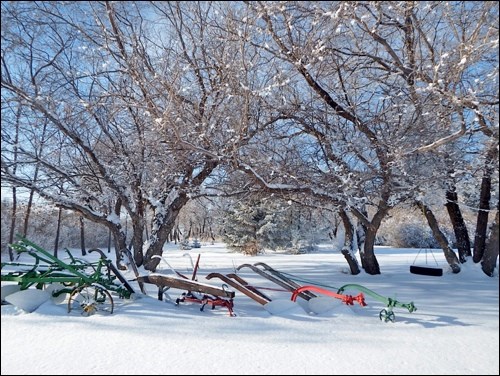What a mammoth storm we had across the prairies. For those of us who watch the weather radar maps, our latest blizzard was interesting. Early on, the storm showed the weather pattern to reach from across the prairies in Canada and extend in a thin line all the way down to California. As the storm progressed, it grew and morphed into a massive ball of blizzard that sat over my home (and likely yours) for many hours. I was watching closely as I was making my way home from Vancouver Island, across the Rockies and back to Saskatchewan. I knew if I did not make the final leg of the journey on Saturday, I might just have to continue to enjoy the green grass of a milder climate. It was a difficult choice.
So, in spite of mountains of snow to shovel from our driveways and walkways and being forced to stay at home due to impassable roads, snow days are beneficial to both plants and to us. Plants are shaped by interaction with their surroundings and the environmental conditions shape the length of the growing seasons and the hardiness zones. As plants are not mobile, they are restricted to using the resources that are in their area and to adapting to the various degrees of environmental harshness. Depending on where we live, the level of biotic and abiotic stress relates directly to our climatic conditions.
The annual distribution and duration of snow is of great importance as it influences the variety of plants that can be grown that are considered perennial in nature. This of course in turn affects the growth and survival of herbivores and this effect will continue up the food chain. Thus, the snow is of greater importance than just looking good as it plays a crucial role in maintaining healthy soils through the winter months.
Early winter snows act as a natural blanket, or insulator. The effectiveness of this insulative layer depends on the amount of snow that collects before the weather gets really cold. These early snows prevent heat from escaping into the atmosphere and by blocking cold air from moving into the soil. This was demonstrated effectively as where I live, there was freezing rain that fell just prior to the heavy snowfall. The ample amount of shovelling of a couple feet or more of snow finally showed that sheer ice had become mushy. More importantly, the heat energy that is trapped by an early and heavy snow will result in a thinner frost area, which is truly a refuge for animal and plant life that call this upper topsoil level home. This in turn allows these soil organisms to continue to live during the winter months.
Furthermore, this early snow is a better insulator than snow that falls in the bitter cold of winter. Nine inches of snow cover can make a 42-degree difference in temperature. A simple example of this would be that if the air temperature is -14 C, then the ground temperature would be -2 C. Just think of what we could grow if we received such a heavy snowfall every year prior to the ground freezing solid.
Another really important occurrence is that with little or no snow cover, those soils are more exposed to the freeze-thaw cycles that can be damaging. This of course is due to the expansion factors that occur when water freezes. Bare soils are also defenceless, as they have no protection from wind, rain and runoff while an early snowfall acts as an armour to protect soil from wind and water erosion.
One last thought to leave you with is for those of us that are already thinking about less than positive things, like all those creepy critters that damage the lovely plants we are growing. Do not worry as in next week’s column, we will focus on other little critters and what happens to all those other organisms when winter begins.
Hanbidge is the lead horticulturist with Orchid Horticulture. Find us at www.orchidhort.com; by phone at 306-931-4769; by email at info@orchidhort.com; on facebook @orchidhort and on instagram at #orchidhort.



